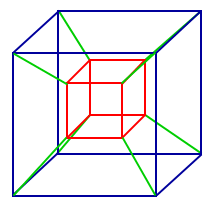Here’s a nice theorem due to Fibonacci, in 1202.
Theorem. If integers N and M can each be written as the sum of two squares, so can their product!
Example: since 2=12+12 and 34=32+52, their product 68 should be expressible as the sum of two squares. In fact, 68=82+22. Is there an easy way to figure out what squares the product will be made of?
Yes! This all follows from the very cool formula:
(a2+b2) (c2+d2) = (ac+bd)2 + (ad-bc)2.
Presentation Suggestions:
Do a few more numerical examples before showing the cool formula.
The Math Behind the Fact:
The formula above can be checked trivially. But there are other ways to see why it is true. If you know some linear algebra, take a look at the Fun Fact Really Complex Matrices, and take the determinant of both sides of the matrix equation there. You will get the formula above!
Or, if you know about complex numbers, the left hand side is the squared modulus of two complex numbers and the right side is the squared modulus of their product!
To see which numbers can be written as the sum of two squares, see Sums Of Two Squares.
How to Cite this Page:
Su, Francis E., et al. “Products of Sums of Two Squares.” Math Fun Facts. <https://www.math.hmc.edu/funfacts>.
Fun Fact suggested by:
Lesley Ward

